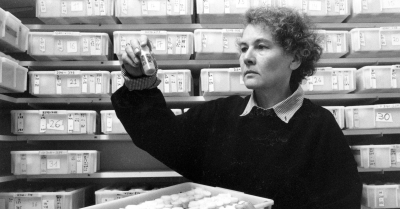
Christiane Nusslein-Volhard is a German geneticist, who was the co-recipient of the 1995 Nobel Prize in Physiology or Medicine for her research on the mechanisms of early embryonic development. Christiane Nusslein-Volhard was born in Heyrothsberge, Germany, in 1942. Christiane studied biology at Goethe University in Frankfurt and biochemistry at Eberhard-Karl University, Tubingen, before undertaking graduate studies at the Max Planck Institute.
Upon completing her PhD in genetics in 1973, Chritiane joined the University of Basel. There she undertook gene study on Drosophila, or fruit flies, an important model organism in genetics. In 1978, she joined the European Molecular Biology Laboratory in Heidelberg. Christiane and her research partner Eric wieschaus studied the embroyonic development of fruit flies and, around 1980, succeeded in identifying and classifying the 15 genes that direct the cells to form a new fly. Their findings had major implications for our understanding of human reproduction, as well. In 1981 she returned to Tubingen, where she served as director of the Max Planck Institute for Developmental Biology from 1985 to 2015. She won the Albert Lasker Award for Basic Medical Research in 1991 and the Nobel Prize in Physiology or Medicine in 1995, together with Eric Wieschaus and Edward B. Lewis.
Chritiane expanded her research beyond Drosophila to vertebrates. In the early 1990s, she began studying genes that control development in the zebra fish Danio rerio. Her investigations in zebra fish have helped elucidate genes and other cellular substances involved in human development.
Picture Credit : Google




